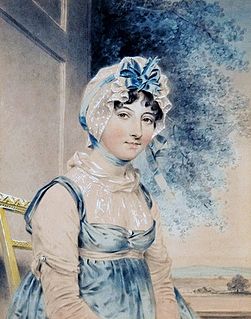A Quote by Willis Regier
Maria Edgeworth grumbled against vandals who ruined immortal works by quoting the life out of them. "How far our literature may in future suffer from these blighting swarms, will best be conceived by a glance at what they have already withered and blasted of the favourite productions of our most popular poets." Shakespeare, Milton, and Dryden, scissored, patched, and frayed.
Related Quotes
If you like poetry let it be first rate, Milton, Shakespeare, Thomson, Goldsmith Pope (if you will though I don't admire him), Scott, Byron, Campbell, Wordsworth and Southey. Now Ellen don't be startled at the names of Shakespeare, and Byron. Both these were great Men and their works are like themselves, You will know how to chuse the good and avoid the evil, the finestpassages are always the purest, the bad are invariably revolting you will never wish to read them over twice.
How fleeting are the wishes and efforts of man! how short his time! and consequently how poor will his products be, compared with those accumulated by nature during whole geological periods. Can we wonder, then, that nature's productions should be far 'truer' in character than man's productions; that they should be infinitely better adapted to the most complex conditions of life, and should plainly bear the stamp of far higher workmanship?
What a contrast between the stern and desolate poetry of Ossian, and that of Chaucer, and even of Shakespeare and Milton, much more of Dryden, and Pope, and Gray! Our summer of English poetry, like the Greek and Latin before it, seems well advanced towards its fall, and laden with the fruit and foliage of the season, with bright autumnal tints, but soon the winter will scatter its myriad clustering and shading leaves, and leave only a few desolate and fibrous boughs to sustain the snow and rime, and creak in the blasts of age.
Life is to be experienced, not fought against, run from, or engaged halfheartedly. Though we may wish to make changes in the future, to be conscious is to be with an experience as it’s unfolding, rather than thinking about how we would like to change it. Taking charge of our life so that we alter the quality of our experiences in the future comes after an experience.
The liberties of our country, the freedoms of our civil Constitution are worth defending at all hazards; it is our duty to defend them against all attacks. We have received them as a fair inheritance from our worthy ancestors. They purchased them for us with toil and danger and expense of treasure and blood. It will bring a mark of everlasting infamy on the present generation – enlightened as it is – if we should suffer them to be wrested from us by violence without a struggle, or to be cheated out of them by the artifices of designing men.
If we don't understand how metaphor works we will misunderstand most of what we read in the Bible. No matter how carefully we parse our Hebrew and Greek sentences, no matter how precisely we use our dictionaries and trace our etymologies, no matter how exactly we define the words on the page, if we do not appreciate the way a metaphor works we will never comprehend the meaning of the text.
Electronic brains may help us to use our heads but will not excuse us from that duty, and as to our hearts-cardiograms cannot diagnose what may be most ill about them, or confirm what may be best. The faithful woman and the versatile brave man, the wakeful intelligence open to inspiration or grace-these are still exemplary for our kind, as they always were and always will be.
If you think about human nature, our favourite pair of shoes are the ones we bought yesterday, our favourite thing is the newest thing that we have…and the thing we’ve seen the most and for the longest period of time is our reflection in the mirror, so obviously that’s going to be our least favourite thing.
He's convinced most human adults do not know how to play anymore and that playing is one of the best ways to think. Franky finds children, by far, much more pleasant and intelligent than most adults, but they are easily ruined by their families, schools, and society. He says one of the ways they are ruined is by being forced to think of all the tasks that need to be done as work, not as play. It takes the joy out of living.
































